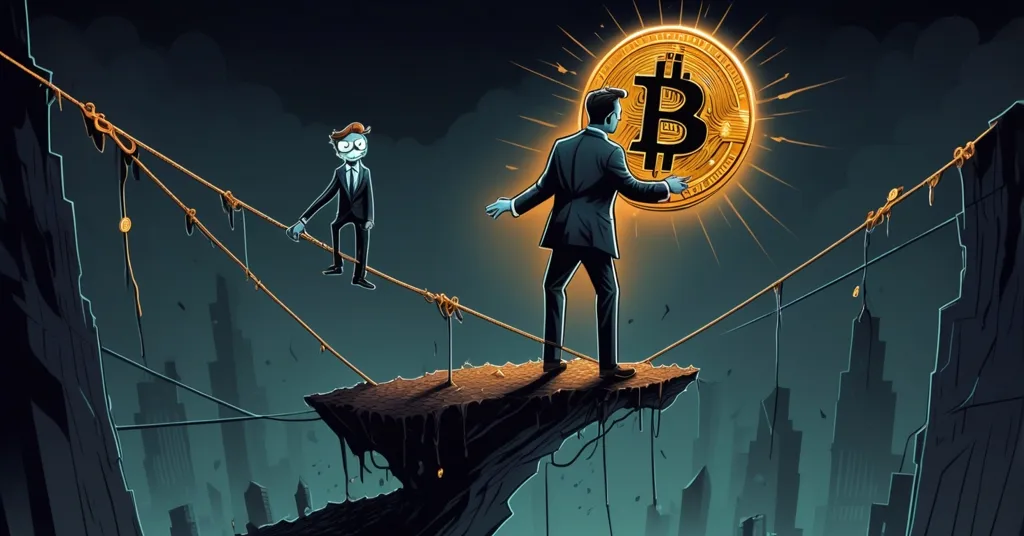Bitcoin as a Risky Lifeline for Small Investors Amid Dollar Decline

Betting on Bitcoin as the Dollar Slides: A Risky Lifeline for Small Investors
As the US dollar stumbles under relentless inflation and shaken trust in traditional finance, Bitcoin has surged into the spotlight as a potential savior for those desperate to protect their wealth. But for small investors, this digital currency isn’t just a hedge—it’s a high-wire act where a single misstep could mean financial ruin.
- Dollar’s Decline Fuels Bitcoin Hype: Inflation and distrust in fiat systems push many toward Bitcoin as a store of value.
- Small Investors at Risk: Extreme volatility, scams, and no safety nets threaten devastating losses for those with limited means.
- Long-Term Hope, Short-Term Hell: Bitcoin’s future might shine, but the immediate dangers could crush the vulnerable along the way.
Why the Dollar’s Fall Drives Bitcoin Fever
The US dollar is bleeding value, and the reasons aren’t hard to see. Years of aggressive money printing by central banks—especially after the pandemic—coupled with geopolitical unrest, have eroded confidence in the world’s reserve currency. Inflation is chewing through savings; a dollar today buys less tomorrow. Meanwhile, the traditional banking system, scarred by memories of 2008 bailouts for Wall Street while Main Street suffered, feels like a rigged game. Bitcoin (BTC), launched in 2009 as a decentralized alternative, offers a way out. With a hard cap of 21 million coins, it’s immune to the endless printing presses of governments. This scarcity is reinforced by halving events—programmed cuts in mining rewards roughly every four years that slow the creation of new Bitcoin, keeping it rare unlike fiat currencies.
Running on blockchain technology, a system where transactions are recorded across thousands of computers worldwide with no single point of control, Bitcoin promises financial sovereignty. No government or bank can inflate its supply or freeze your funds without your private key—a cryptographic password to your digital wallet. This is why heavyweights like venture capitalist Tim Draper see it as the future, with some of his bold Bitcoin price forecasts stirring excitement in the community.
“Tim Draper predicts BTC will become the new standard for saving and spending money in a digital world within the next 10 to 20 years, after the US dollar completely disappears as a trusted global currency.”
Draper’s vision positions Bitcoin as the ultimate middle finger to a failing fiat system. During times of economic uncertainty, like post-2020 stimulus when inflation spiked, Bitcoin has often rallied—its price jumping over 300% from March 2020 to late 2021, peaking near $69,000. Often dubbed “digital gold,” it’s a beacon for those who believe the dollar’s days are numbered, especially as the decline of the US dollar continues to impact global markets. But before we start chanting “to the moon,” let’s ground ourselves in the brutal reality facing small investors—ordinary folks with limited savings who can’t afford to ride out a storm.
The Harsh Truth: Bitcoin’s Risks for Small Investors
Bitcoin’s biggest selling point—its decentralized, trustless nature—comes with a savage downside: volatility that can gut your portfolio overnight. We’re talking drops of 50% to 80% in mere weeks or months. Rewind to 2018, when BTC crashed from nearly $20,000 to under $3,000, wiping out countless investors. Or look at 2022, when the collapse of major players like FTX triggered a similar bloodbath. Wealthy investors shrug off these dips; they’ve got the cash to “HODL” (hold on for dear life, in crypto slang) until recovery. Small investors? They’re screwed. When rent is due or a medical bill hits, they’ve got no choice but to sell at a loss, turning a hopeful bet into a financial wound, as explored in various case studies on Bitcoin’s price swings.
“In simple words, Bitcoin might win in the long run, but small investors could lose everything on the way there.”
Volatility isn’t the only predator. The crypto space is the Wild West, teeming with scams that feast on the desperate and uninformed. Ponzi schemes like Bitconnect, which collapsed in 2018 after defrauding thousands, promised guaranteed returns only to vanish with millions. Rug pulls—where developers hype a token and then disappear with the funds—are rampant; the Squid Game Token in 2021 scammed investors out of over $3 million in days. Then there are phishing scams, fake exchanges like BitKRX, and SIM swap frauds that have stolen tens of millions (one investor, Michael Terpin, lost $24 million in a single attack). Unlike banks with deposit insurance, crypto offers no safety net. Get hacked or lose your private key? Kiss your money goodbye. For deeper insight into these threats, check out community discussions on common crypto scams.
Psychological Warfare and Platform Perils
Even if you dodge the scammers, the psychological toll of Bitcoin investing can break you. FOMO—fear of missing out—pushes small investors to buy at euphoric peaks, often right before a crash. When the inevitable drop comes, panic sets in, and they sell at the bottom, locking in losses. It’s a vicious cycle, made worse by financial pressures the wealthy don’t feel. Need cash for an emergency? You’re not strategizing; you’re surviving, often at the cost of your investment, a point often raised in forums discussing Bitcoin’s risks for everyday investors.
Then there’s platform risk. Exchanges get hacked, go bankrupt, or just lock users out with no warning. Think Mt. Gox in 2014, where 850,000 BTC (worth billions today) vanished, or more recent debacles like FTX. There’s no FDIC insurance here, no government hotline to call. If a platform fails or a scammer drains your wallet, you’re on your own. This stark reality raises a haunting concern.
“Does digital currency hide dangers that could destroy the wealth people are trying to save?”
Playing Devil’s Advocate: Isn’t the Traditional System Worse?
Let’s flip the script for a moment. Yes, Bitcoin is a minefield, but isn’t the fiat system just as broken—maybe more so? Small investors have been shafted by banks and governments for decades. The 2008 crisis saw Wall Street bailed out while regular people lost homes. Inflation now eats savings alive, with the US Consumer Price Index hitting 9.1% in mid-2022, the highest in four decades. Bitcoin, for all its flaws, offers an escape from that rigged game as a potential hedge against inflation. Despite wild swings, its price has trended upward over a decade—early adopters who bought at cents are millionaires today. Couldn’t small investors, with caution, still beat a dying dollar?
From a Bitcoin maximalist lens, there’s another angle: BTC is the only crypto with a proven track record of resilience. Altcoins and DeFi (decentralized finance) projects might dazzle with promises of innovation—think Ethereum’s smart contracts, automated agreements on the blockchain—but they’re often a distraction. Many are outright scams or collapse under their own complexity, like Terra/Luna’s $40 billion implosion in 2022. Bitcoin’s simplicity as a trustless store of value makes it the bedrock of this revolution. Why gamble on shiny new tokens when BTC has already weathered over a decade of storms?
The Dark Side of Decentralization: Scams and Systemic Hurdles
Caution, though, is a luxury many small investors don’t have—neither in time nor education. The crypto market isn’t just Bitcoin; it’s a jungle of altcoins and DeFi schemes hyping moonshot gains but delivering pain. Small players, chasing quick wins, dive into unproven tokens only to get burned by rug pulls or smart contract exploits—coding flaws hackers use to steal funds. Even sticking to Bitcoin doesn’t shield you from market crashes or fraud. Scammers aren’t just opportunists; they’re predators, exploiting desperation with fake giveaways or phishing sites that steal your keys. And with minimal regulation, there’s no sheriff in this town, as echoed by many in discussions on why Bitcoin poses dangers for newcomers.
Beyond scams, Bitcoin itself faces roadblocks to becoming the global currency Draper envisions. Transaction speeds are slow compared to Visa or PayPal, though solutions like the Lightning Network—a secondary layer for faster, cheaper payments—are gaining traction with millions in transaction volume yearly. Energy consumption is another sticking point; Bitcoin mining, the process of validating transactions via complex computations, guzzles power. Estimates from the Cambridge Bitcoin Electricity Consumption Index peg it at more than some small countries, though renewable energy adoption in mining is rising. Then there’s the specter of government crackdowns—China banned Bitcoin mining in 2021, and the US could push restrictive laws or rival central bank digital currencies (CBDCs). These hurdles don’t kill Bitcoin’s potential, but they sure as hell complicate the journey, especially given the ongoing volatility challenges for small investors.
Navigating Bitcoin Safely: Tips for Small Investors
So, is Bitcoin a death trap for small investors or a ticket to freedom? Truth is, it’s both, depending on how you play it. We’re all for disrupting the status quo and accelerating toward a decentralized future, but not at the cost of naive casualties. If you’re dipping into BTC with money you can’t lose, you’re not investing—you’re gambling on a rigged table, a sentiment shared widely in analyses like warnings about Bitcoin’s pitfalls for small investors. Here’s how to tilt the odds in your favor:
- Use Reputable Exchanges: Stick to well-known platforms like Coinbase or Binance, and enable two-factor authentication (2FA) to secure your account.
- Secure Your Funds: Move your Bitcoin off exchanges into a hardware wallet—a physical device like Ledger or Trezor that stores your private keys offline, safe from hacks.
- Dollar-Cost Averaging (DCA): Don’t buy all at once; spread purchases over time to reduce the impact of volatility.
- Never Share Private Keys: Scammers will pose as support staff or promise giveaways—ignore them. Your key is your money.
- Educate Yourself: Research before investing. If a project sounds too good to be true, it probably is. Stick to Bitcoin over speculative altcoins unless you really know the game.
Bitcoin might be digital gold, but for small investors, it’s often a digital landmine. The dollar’s collapse may be real, but betting your last dime on BTC could blow up faster than fiat if you’re not prepared for the ride. Global stances vary too—El Salvador made Bitcoin legal tender in 2021, while China’s ban spooks markets. Where you stand impacts your risk. We champion decentralization and privacy, but let’s not kid ourselves: this revolution claims victims. Are you ready to risk it all for a shot at financial freedom?
Key Takeaways and Questions on Bitcoin’s Role and Risks
- What’s driving the rush to Bitcoin as the US dollar weakens?
Soaring inflation and eroded trust in centralized finance make Bitcoin’s fixed supply and independence from government control an appealing hedge against a failing fiat system. - Why is Bitcoin a dangerous bet for small investors?
Brutal price drops of 50-80%, no safety nets for hacks or platform failures, and psychological traps like FOMO and panic selling can wipe out those who can’t hold through downturns. - How do scams target small investors in the crypto space?
Predators exploit inexperience with fake tokens, Ponzi schemes like Bitconnect, rug pulls like Squid Game Token, and phishing attacks, thriving in a barely regulated market. - Can Bitcoin offer short-term financial security?
Hardly—its wild price cycles and long recovery periods force small investors needing quick cash to sell at losses, making it unreliable for immediate needs. - What’s the long-term outlook for Bitcoin, and should we buy the hype?
Advocates like Tim Draper see it replacing fiat in decades, but missed targets like $250,000 by 2023 and challenges like scalability and regulation demand skepticism alongside optimism.



